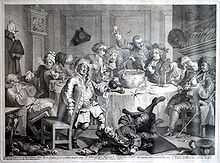Punch
As a punch (after Hindi पांच PANC "five") an alcoholic, mostly hot mixed drink is called, originally from India comes and (hence the name) consists of five ingredients. The traditional ingredients are arrack , sugar , lemons and tea or water with spices .
history

English sailors from the British East India Company got to know the drink in India under the Hindustan name “pantsch” (five) and called it “punch”. They brought the drink to Europe in the 17th century.
In the 17th century the drink came to Germany. In 1735, Johann Heinrich Zedler translated the English name Punch into "Puntsch" in his large, complete Universal Lexicon of All Sciences and Arts . The ingredients of the "strong drink" were: brandy , water, sugar, bitter orange juice and nutmegs .
In the 18th century the drink was occasionally drunk cold.
Wolfgang Amadeus Mozart got to know the drink in 1764 during a trip to England, at that time it was still unknown in Vienna and Salzburg . Leopold Mozart enthusiastically reported to his friend Hagenauer about his son's later favorite drink: “Punch, is punch pronounced, and is a drink boiled from water, rum, sugar and lime. Can be drunk hot or cold as you like ... Punch and a pipe tobacco is the English element ”. The German romantic ETA Hoffmann created a literary memorial to the punch in his novella The golden pot : “ The registrar Heerbrand reached into the deep pocket of his matin and brought out a bottle of arrack, lemons and sugar in three repeats. Hardly half an hour had passed when a delicious punch was steaming on Paulmann's table. "
Preparation and variations
During preparation, care should be taken to ensure that the drink is only heated and does not start to boil, so that the aroma and alcohol are retained. Furthermore, only untreated lemons should be used, as the lemon peel or whole lemon wedges can be added as a flavoring ingredient, depending on the taste.
A cookbook from 1903 gives the following punch recipe: “You rub the yellow of 4 lemons on sugar, brew 8 grams. Fine black tea with 1.5 l of boiling water, squeeze in the lemon juice, pour the tea through a towel into a pan, add the sugar on which the lemons were rubbed and pour ¼ l of arrak. Now you cover the pan and let the punch sit over the fire until it comes to a boil; then it is immediately poured through a napkin into the punch terrine and served. "
The alcohol component arrak , a high-proof spirit made from palm sugar juice and rice mash, whose aroma is similarly spicy and intense as that of rum , is now often replaced by rum, brandy or wine .
A well-known variant is the Feuerzangenbowle . The eggnog is a variant in which the punch eggs - are added - in the form of stiff beaten egg white and yolk mixed with rum. The popular in Northern Germany Frisian tea punch is made of thin tea and Kom prepared.
The non-alcoholic variants include the driver's punch , which mostly consists of black tea and orange juice and is seasoned with cinnamon and cloves, and the sweeter children's punch based on fruit tea.
In Austria and the Czech Republic in particular, punch is the most popular drink at Christmas markets alongside mulled wine and Jagertee .
The New Year's Eve punch came into fashion in Germany on New Year's Eve around 1900 to toast the New Year; Sparkling wine came into fashion later.
reception
Friedrich Schiller (1759–1805) contented himself with four ingredients in his punch song - lemons, sugar, water and "spirit" (spirits) - and interpreted them in his sense:
Punch song
Four elements,
intimately connected,
form life,
build the world.
Press the lemon
juicy star!
Herb is life's
innermost core.
Now with the sugar
soothing juice
Tames the bitter
burning power!
Pour the gushing gush of water
!
Water calmly surrounds
the universe.
Pour in
drops of the Spirit
!
He
gives life to life alone.
Before it evaporates,
draw it quickly,
only when it glows,
refresh the source.
swell
literature
- Tim Cole: Mulled wine, punch and Feuerzangenbowle . 2nd edition, Graefe and Unzer, Munich 1992, ISBN 3-7742-1117-5 .
- Nina Musey: Punch and mulled wine in Advent. Delicious recipes for the quiet time . 1st edition. Goldegg Verlag , Vienna 2006, ISBN 3-901880-98-4 .
Individual evidence
- ↑ a b c Julia Jones u. a .: Delicious culinary yearbook of celebrations and festivals . Gerstenberg Verlag, Hildesheim 1996, ISBN 3-8067-2810-0 , p. 27.
- ↑ Puntsch, Punch. In: Johann Heinrich Zedler : Large complete universal lexicon of all sciences and arts . Volume 29, Leipzig 1741, column 1627.
- ↑ Ingrid Haslinger: "and ate a canned veal for lunch". WA Mozart and his meals . Edition Tandem, Salzburg 2005, ISBN 3-9501570-5-0 .
- ↑ ETA Hoffmann: The golden pot in Project Gutenberg , IX. Vigil.
- ↑ Cooking school and adviser for family and home ; 1903-1905.
- ↑ See culture in the district of North Friesland .
